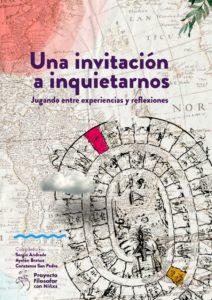An invitation to be concerned: Playing between experiences and reflections
Keywords:
philosophy, childhoodSynopsis
An invitation to question ourselves. Playing between experiences and reflections, it is a work that moves and touches us. It invites us to step outside our comfort zones, outside the realm of knowledge. It moves us with the experiences shared by children who took part in the many workshops, offering us a glimpse of those experiences through the voices of the actors: children and adults in constant learning. The authors invite us to enter the world of philosophy, of doing philosophy, in connection with childhood and education. Organized into four parts—Childhood and Politics; Territorialities; (Il)logics; and Sexualities—the book introduces us to a philosophical experience that proposes deconstructing representations of childhood, and it does so with a very original invitation: “Return to childhood to recover childhood,” our own childhood, the one that lives within each of us. The work also includes an introduction that allows us to learn about the history of the “Philosophizing with Children” project. This outreach project began in 1995 and has not stopped since then, generating movements in multiple territories. It also offers us some “de-instructions” to begin one of the possible journeys through the book.
Chapters
-
Foreword. Novelty and Restlessness
-
Introduction
-
Game instructions
-
Instructions for a new game
-
Childhood and politics
-
Childhood as a hypothesis of infancy. Methodological, theoretical, and political strategies
-
Simon says. Tensions between the idea of freedom and the game of rules
-
Loitering and political education with children
-
Territorialities
-
Reflections from practice: popular education and philosophizing with children
-
The school that didn't want to be gray. Stories about how the children's organization transformed the school
-
The (im)possible map. Collective cartographies in our territories
-
Opening the neighborhood's doors to play, imagine, create
-
Philosophizing on the sidewalk outside the library. Challenges in non-formal education spaces
-
Reading from what happens in my own body to think about politics in a different way
-
(i)logical
-
Reading and writing: denaturalizing practices in school that make us readers and writers
-
Strategies for speaking up: doors and windows provided by art
-
The reasons we construct to communicate
-
Philosophizing with others. Reflections on knowledge, childhood, and sex education from our perspective as educators
-
The language of invitation. Or on a possible link between picture books and collective philosophizing .
-
Sexualities
-
Sexualized childhoods. Reconsidering binaries and dichotomies
-
Trans/queer childhoods or the trans/queer nature of childhood?
-
Comprehensive Sex Education: an alternative for reflection on teaching practices

Downloads
Published
Categories
License

This work is licensed under a Creative Commons Attribution-NonCommercial-ShareAlike 4.0 International License.


